Here are many short articles, all of which together make a respectable Post.
I’m sending this Post out half a day early – I hope it doesn’t throw off your whole weekly schedule! – to remind you of this great Feast. Perhaps you’ll be able to get to Divine Liturgy tomorrow morning.
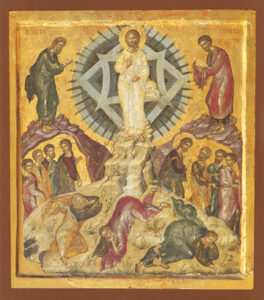 1. The Feast of the Transfiguration of Our Lord God and Savior Jesus Christ – Friday August 6.
1. The Feast of the Transfiguration of Our Lord God and Savior Jesus Christ – Friday August 6.
If you’d like to read a simple commentary about this great Holy Day, go to: “Father Bill’s Orthodox Blog Post 137. The Transfiguration – The Other Great Forgotten Feast”.
If you search a bit, you can easily find many more scholarly and profound commentaries.
Icons by permission of Saint Isaac’s Skete at skete.com
2. His All-Holiness Bartholomew, Patriarch of Constantinople, on Covid-19 and on the Environment
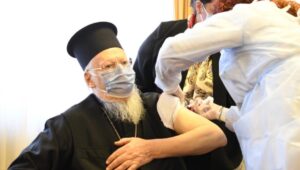 1 “On Thursday January 28th, 2021, shortly before midday, His All Holiness Ecumenical Patriarch Bartholomew was administered the COVID-19 Vaccine at the University Medical Center CAPA in Istanbul. His All Holiness thanked the doctors and staff of the Medical Center, and through them, all frontline healthcare workers throughout the world for their self-sacrifice as they care for the infected and their loved ones. It is His All Holiness’ fervent prayer that everyone get vaccinated as soon as possible to contain this global and deadly virus.”
1 “On Thursday January 28th, 2021, shortly before midday, His All Holiness Ecumenical Patriarch Bartholomew was administered the COVID-19 Vaccine at the University Medical Center CAPA in Istanbul. His All Holiness thanked the doctors and staff of the Medical Center, and through them, all frontline healthcare workers throughout the world for their self-sacrifice as they care for the infected and their loved ones. It is His All Holiness’ fervent prayer that everyone get vaccinated as soon as possible to contain this global and deadly virus.”
from the Greek Orthodox Archdiocese of America
2 “Orthodoxy is committed to ecology; it is the “green” Church par excellence. Our faith and our worship strengthen our commitment to the protection of creation and promote the “eucharistic use” of the world, the solidarity with creation. The Orthodox Christian attitude is the opposite of the instrumentalisation and exploitation of the world.”
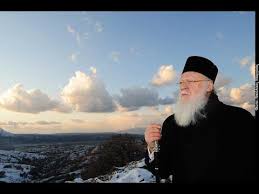 “We believe that the roots of the environmental crisis are not primarily economic or political, nor technological, but profoundly and essentially religious, spiritual and moral. This is because it is a crisis about and within the human heart.”
“We believe that the roots of the environmental crisis are not primarily economic or political, nor technological, but profoundly and essentially religious, spiritual and moral. This is because it is a crisis about and within the human heart.”
“This world is not just a gift from God; it is a challenge for humanity. We have at last come to learn the truth that we have mistreated the natural environment and its resources. The consequences are plain and painful. They are evident in the air that we breathe, the water that we drink, the food that we consume, the emotional and physical problems that we face in our health, but also in our relationships with each other on the local, regional, national and global levels.”
“As greed overcomes our communities, consumption increases beyond what the earth can possibly sustain. In other words, the greedy ravage more resources than the earth can ever renew. Possessing the earth in such a selfish way deprives it of its life-giving properties and poses a great threat to the rest of creation.”
“Global warming is a moral crisis and a moral challenge.”
from the Ecumenical Patriarchate of Constantinople
For much more from the “Green Patriarch”, go to: http://patriarchateofconstantinople.com/the-enviroment.html
3. Father Thomas Hopko’s Fifty-five Maxims for Christian Living
I’m repeating these from my Post 206 of last year, because Father Tom’s Maxims are the best simple guide to Christian living that I have ever found, and I don’t want any of you to miss or ignore them.
I have copied them as an icon on my computer screen. I, being a “modernist” – only in this regard! – pray using my computer. Before my morning intercessions each day I take a few minutes to ponder ten of the Maxims – focusing perhaps on two or three that strike me at the time – then the next ten on the next day, and so on.
I hope you will do the same. If not on your computer screen, you might print a copy and put it in your prayer book or in your icon corner or on your refrigerator – anywhere so you’ll see them.
Father Tom, in case you don’t know, was Dean and Professor at Saint Vladimir’s Theological Seminary, a notable Orthodox author and speaker, and a man who was of great help personally to a vast number of people, including me. I pray for him every day. May his memory be eternal.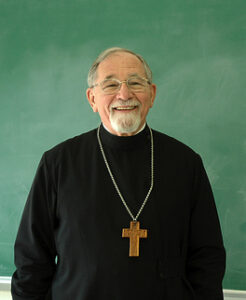
You can find a multitude of his podcasts, books, lectures and more at Ancient Faith Ministries.
Also search for him at Saint Vladimir’s Bookstore, or on Amazon.
from Creative Commons
I just came across this appreciation of Father Hopko, written by an Anglican priest: https://livingchurch.org/covenant/2015/09/28/fr-hopko-my-favorite-priest/
Father Tom’s Maxims
1 Be always with Christ and trust God in everything.
2 Pray as you can, not as you think you must.
3 Have a keepable rule of prayer done by discipline.
4 Say the Lord’s Prayer several times each day.
5 Repeat a short prayer when your mind is not occupied.
6 Make some prostrations when you pray.
7 Eat good foods in moderation and fast on fasting days.
8 Practice silence, inner and outer.
9 Sit in silence 20 to 30 minutes each day.
10 Do acts of mercy in secret.
11 Go to liturgical services regularly.
12 Go to confession and holy communion regularly.
13 Do not engage intrusive thoughts and feelings.
14 Reveal all your thoughts and feelings to a trusted person regularly.
15 Read the scriptures regularly.
16 Read good books, a little at a time.
17 Cultivate communion with the saints.
18 Be an ordinary person, one of the human race.
19 Be polite with everyone, first of all family members.
20 Maintain cleanliness and order in your home.
21 Have a healthy, wholesome hobby.
22 Exercise regularly.
23 Live a day, even a part of a day, at a time.
24 Be totally honest, first of all with yourself.
25 Be faithful in little things.
26 Do your work, then forget it.
27 Do the most difficult and painful things first.
28 Face reality.
29 Be grateful.
30 Be cheerful.
31 Be simple, hidden, quiet and small.
32 Never bring attention to yourself.
33 Listen when people talk to you.
34 Be awake and attentive, fully present where you are.
35 Think and talk about things no more than necessary.
36 Speak simply, clearly, firmly, directly.
37 Flee imagination, fantasy, analysis, figuring things out.
38 Flee carnal, sexual things at their first appearance.
39 Don’t complain, grumble, murmur or whine.
40 Don’t seek or expect pity or praise.
41 Don’t compare yourself with anyone.
42 Don’t judge anyone for anything.
43 Don’t try to convince anyone of anything.
44 Don’t defend or justify yourself.
45 Be defined and bound by God, not people.
46 Accept criticism gracefully and test it carefully.
47 Give advice only when asked or when it is your duty.
48 Do nothing for people that they can and should do for themselves.
49 Have a daily schedule of activities, avoiding whim and caprice.
50 Be merciful with yourself and others.
51 Have no expectations except to be fiercely tempted to your last breath.
52 Focus exclusively on God and light, and never on darkness, temptation and sin.
53 Endure the trial of yourself and your faults serenely, under God’s mercy.
54 When you fall, get up immediately and start over.
55 Get help when you need it, without fear or shame.
3. True Spirituality
 by Nicholas Karellos, in the journal Road to Emmaus, Summer 2019
by Nicholas Karellos, in the journal Road to Emmaus, Summer 2019
Mr Karellos is a Greek Orthodox tour guide. “Road to Emmaus” is an excellent Orthodox quarterly. Subscribe! Go to https://www.roadtoemmaus.net/
Old copies of the journal are orderable, by the way, including this one.
The term “spiritual” has been twisted, especially in America where even Orthodox consider some practices to be spiritual while others are worldly and secular. I don’t believe this is the case.
A nice meal from natural ingredients prepared by a tavern owner in a small village who has an icon corner in his taverna and lights the old lamps of the twelfth-century chapel next door every morning also can be spiritual. If the meal is made with love this is spiritual. An unspoiled beach and a beautiful sunset can bring you closer to God than words. A fisherman on the dock mending his nets the old way can be a philiosopher, as can a shepherd who spends most of his time in the mountains. The illiterate grandmother knitting on her doorstep who offers you a glass of water is spiritual, as is the smell of incense in a narrow island street.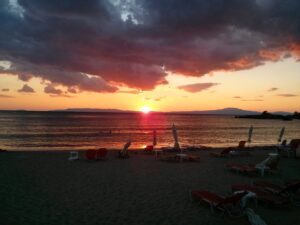
My photo, from the Peloponnese of Greece
A word that a priest or a nun might give you is spiritual as well, but telling jokes to make people laugh can be as spiritual as a reverent silence. This spirituality that is woven into life has been part of our culture from the ages. It is everywhere, like the icon hanging on a wall of a tavern, in a prison cell, or on the dashboard of a public bus. Spiritual is also enjoying life as God’s gift to us, without guilt. Even something “worldly” can be spiritual if one has the eyes to see it that way.
This is what has kept illiterate Greeks Orthodox through the ages, under oppression and persecution. And it still keeps many of us joyful today despite our crushing economic problems. It is seeing God in every little thing, having the church as a battery charger and the monasteries for refuge.
4. What has changed since I first went to Greece?
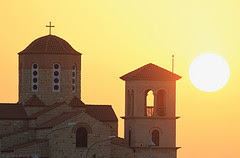
My photo from somewhere on Crete – can’t remember where
What follows here is from my Travel Journal, Friday September 23, 2005, sixteen years after I was chrismated into the Holy Orthodox Church.
I’m Orthodox! That seemed inconceivable in 1985, when I first came to Greece.
Now I’m much more relaxed (maybe the best way to say it is “less uptight”) about religion. Orthodoxy just is what it is – doesn’t need me to defend it. I’ve learned to trust it – not always the structures, though they often function surprisingly well, despite themselves * – but the religion itself. It has an authority and depth which I never imagined to exist and have only begun to fathom. As I read the ancient Orthodox Fathers and the modern authors, I know and feel I’m such a neophyte. I certainly hope there’s growth in heaven, because I’m running out of time here, and I have such a long way to go.
- In the 1920s the humorist Will Rogers famously said, “I don’t belong to any organized political party. I’m a Democrat.” I am sometimes tempted to rephrase him: “I don’t belong to any organized religion. I’m Orthodox.”
5. “Living in Sin”
That’s what we used to call it. This is a last minute addition to this Post because of something I discovered this week: My Orthodox sports hero of last week, Giannis Antetokounmpo, is not married to the mother of his son and of their new baby on the way. The Milwaukee Journal Sentinel reported so casually that she is “his girlfriend”.
Once upon a time not so long ago this fact would not have been reported at all, out of embarrassment for such a moral laspse. But today? It’s all around us. Giannis. The  nice guy across the street from us who occasionally “shacks up” (as we once said) there with his girlfriend. The sweet young Physical Therapy woman who comes to help me as I recover told me without embarrassment (and she knows I’m a priest) that she is living with her fiance, and was also doing so before they were engaged. I asked, pointedly, “When will you get married?” She answered, “In two months”. In a firm voice I said “Good!”, but I’m sure she didn’t get my point.
nice guy across the street from us who occasionally “shacks up” (as we once said) there with his girlfriend. The sweet young Physical Therapy woman who comes to help me as I recover told me without embarrassment (and she knows I’m a priest) that she is living with her fiance, and was also doing so before they were engaged. I asked, pointedly, “When will you get married?” She answered, “In two months”. In a firm voice I said “Good!”, but I’m sure she didn’t get my point.
from FreePix
Are we Orthodox (I hope) still troubled by this? Or is it only me? Well, I’m not alone: Someone suggested not long ago that most modern brides, instead of wearing white, should wear a shade of grey!
However, seriously, here are the stats: Pew Research reports that in 1969, 69% of Americans believed pre-marital sex was wrong; today it’s only 25%. Today only 17% Americans believe couples cohabitating before marriage is wrong (8% of them apparently with no sex! if I read this right), and 44% of Americans ages 19-28 believe marriage is obsolete!
Isn’t it obvious that this is dangerous to society? When couples are just “living together”, even when there are children, one of the parties can walk out tomorrow morning with no strings attached. This seems especially easy for the man to do. Why isn’t this an issue in these days when we are (properly) so concerned with the rights of women? Granted, it’s pretty easy to get a divorce these days – but at least it takes some effort. Don’t couples love each other enough to want to provide their “significant other” (and their children) with commitment? solidity? marriage? I don’t understand.
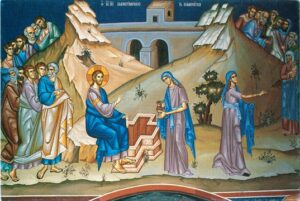 Now, you’ll recall that Jesus didn’t condemn the Woman of Samaria. He just pointed out that “the man you are living with now is not your husband” and thereby embarrassed her half to death, because she knew that was a sin, as did everybody else. In fact, Christ didn’t condemn anybody except the proud scribes and pharisees who loved to run around condemning others. He said He came “not to condemn the world but to save it”. John 3:17 Jesus was the Great Forgiver, the Great Encourager. As so should we be.
Now, you’ll recall that Jesus didn’t condemn the Woman of Samaria. He just pointed out that “the man you are living with now is not your husband” and thereby embarrassed her half to death, because she knew that was a sin, as did everybody else. In fact, Christ didn’t condemn anybody except the proud scribes and pharisees who loved to run around condemning others. He said He came “not to condemn the world but to save it”. John 3:17 Jesus was the Great Forgiver, the Great Encourager. As so should we be.
I am not one of those who think the modern world is going to staight to hell. Lawrence Durrell wrote somewhere * that the world doesn’t have civilized ages and barbarous ages. Rather civilization and barbarism exist in the world and in every society at the same time. As we become civilized in certain ways, at the same time we fall back into barbarism in others.
- Now that I want his exact quote, I can’t find it. If you know it, please share it, for he said it much better and more succinctly than this.
Many things are getting better in America today – and if you’d like I’ll list some of them for you. But many other things are getting worse, and this one really worries me, for I believe the traditional family is the foundation of society.
Next Week: for The Dormition of the Theotokos
Week after next: Thinking Orthodox – Part One